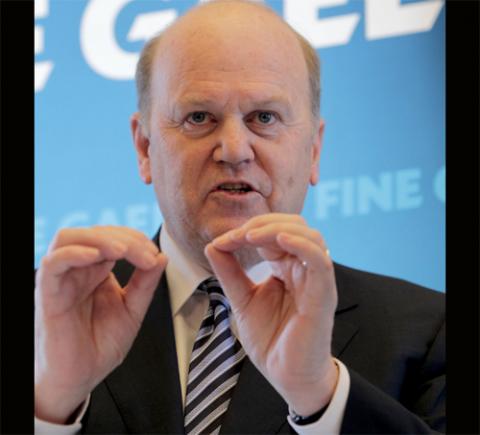Another victory for banks and bankers

An amendment to the forthcoming European Stability Mechanism unveiled by Eurozone finance ministers at a meeting on Monday which Michael Noonan described as "very good news for Ireland" is anything but, writes Ann Pettifor.
I find it hard to write about the crisis in Greece, because the tragedy unfolding there is so reminiscent of the tragedies that unfolded in Africa, Latin America and South East Asia in the 80s and 90s – and I was very close to those. Seeing the same economic mismanagement replicated in well-armed Europe is scary. Watching as tensions rise between the peoples of Europe, given our bloody history is frightening. So I have been silenced by rage.
But my outrage boiled over today, because of what the FT wrongly calls a ‘subtle’ change unveiled by EU finance ministers to the terms of the massive Eurozone bailout fund – a fund backed by European taxpayers. This is how the FT explains it:
Any bonds issued in future by the eurozone’s new €500bn rescue fund on behalf of Ireland, Greece or Portugal will not enjoy “preferred creditor status” – an alteration to the fund intended to help those nations return more swiftly to private capital markets.
For those who do not dabble much in sovereign debt, let me explain. Common to the whole of the international financial architecture/system for sovereign lending, there is one principle that overrides all others. That the IMF/World Bank are ‘preferred creditors’. Just as when a company goes bankrupt, the supplier that sold it widgets is ranked lower than the bank that provided the overdraft – so in international ‘law’ taxpayer-backed lending from the IMF and World Bank is ‘preferred’ when it comes to repayment – over all private commercial lending. And it is preferred because it is public money.
In other words, when the public cough up - via an international institution such as the IMF or the ECB - then the sovereign (e.g. Greece/Argentina/Rwanda) has to pay taxpayers back first.
Yesterday, on behalf of EU taxpayers, EU finance ministers obliged private bankers by overturning that principle.
Instead they agreed effectively that private bankers will get preference and will be repaid before taxpayers.
Michael Noonan, the Irish finance minister, described it as “very good news for Ireland that this scheme has been amended so that anybody who borrows will have the same ranking whether there’s an ESM programme or not.” He was told by investors in the US that Ireland and other countries subject to bailouts “would find it virtually impossible to get back into the market and access private funds as long as this provision remained”.
Now, my understanding is that Michael Noonan is a democratically elected finance minister. What he is agreeing to here - enthusiastically - is that taxpayer funded loans will have a lower repayment status than private commercial loans - debts owed to private banks/hedge funds etc. These private banks lent recklessly to, for example, Irish private banks and colluded with the previous Greek government in concealing the true status of its foreign debts.
They are private bankers that expect the rules of the market to be replaced by a form of Soviet economics - that removes all risks associated with the private business of lending and borrowing - and instead provides taxpayer guarantees against all losses. And with those guarantees - and this new ‘preferred status’ - these financial institutions continue to recklessly speculate and gamble in EU debt.
There will be very little outrage about this apparently ‘subtle’ change to the international financial architecture by our elected politicians. But, be sure, it is another nail in the coffin of EU democracy. An example of bankers usurping power (and money) from the people of Europe - with the collusion of democratically elected EU politicians.
It will all end, I fear, very badly - and not just for the politicians.
Originally published on Debtonation.org. Ann Pettifor is co-author of the Green New Deal, a fellow of the New Economics Foundation, and Director of Advocacy International Ltd and PRIME (Policy Research in Macroeconomics).
